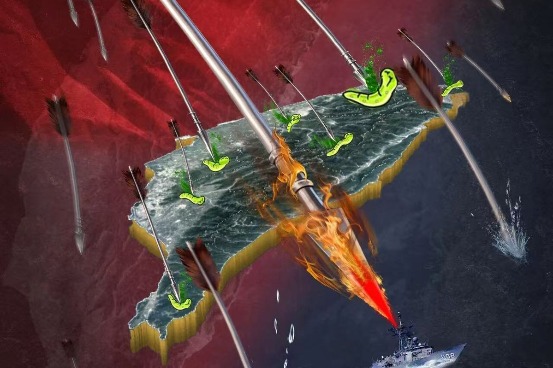From decoupling to reconnecting


Addressing the pressing global challenges depends on the West's capacity to work with China and vice versa
As deeper historical trends largely unfold independently from any individual, be it the commander-in-chief of the world's mightiest power, the changes that the election of Joe Biden as the 46th US president may induce should not be overestimated.
However, when compared with the policies of his immediate predecessor, the reorientations that the new US administration has signaled are significant.
Following a mandate structured around putting "America First", the new chapter opened by Biden will be about the preeminence of diplomacy.
In this context, the European Union, China and the United States find themselves aligned on three major issues: multilateralism, global governance and the recognition of the gravity of the climate crisis.
Viewing multilateralism as the right way to confront the transnational issues of our century, Biden's approach to foreign policy will be similar to the one that both the EU and China advocate.
With a proponent of internationalism seating in the Oval Office, the United Nations system will be in a better position to answer the call for more effective global governance. In the field of global governance, US, EU and Chinese policies will reinforce each other for the benefit of the community of nations.
The newly elected president will take his country back into the World Health Organization when mankind is battling a deadly pandemic. As secretary of State, Antony Blinken, whose affinities with France are well known, could well take his country back into the Paris-based United Nations Educational, Scientific and Cultural Organization. In the security domain, a Biden administration could also rejoin the Joint Comprehensive Plan of Action, the Iran nuclear deal framework, which was signed five years ago.
On the long-term global environmental challenge, the 46th US president embodies a positive shift reminiscent of the geopolitical configuration conducive to the 2015 Paris Agreement. The nomination by Biden of John Kerry as his climate envoy means that the US is not only on the way to rejoining the Paris Agreement, but that its diplomacy will push for its implementation.
It is therefore evident that in the coming four years, China's ambition to build an ecological civilization, the EU's green deal, and what Biden's campaign has presented as a plan for a clean energy revolution and environmental justice will synergize a clear response to the climate emergency.
However, Biden's election can't be seen as a guarantee for long-term harmonious relations between the world's two largest economies.
Besides the usual issues that the incoming US Trade Representative Katherine Tai will negotiate with her Chinese counterpart, the new US administration is expected to emphasize the political differences that exist between the two countries. By doing so, especially when he convenes the global Summit for Democracy in the coming months, Biden will bring the EU, Japan and India together, while de facto leaving China out.
In relations with China, the policy of the Trump administration has been an attempt for hard decoupling. The promotion of a hard decoupling impacted the global supply chain and the technology sector.
However, the bid for a hard decoupling did not alter the trend of interdependence, the underlying feature of our time. Moreover, it certainly did not weaken China, whose economy kept expanding while all other G20 members entered a recession due to the COVID-19 crisis.
For the analysts, be they in Washington DC or in the European capitals, the Trump presidency has shown that the determinants of the Chinese renaissance are largely internal to the Chinese world, and are certainly not decided at the White House or elsewhere.
To put it in other words, only a series of unwise Chinese moves could contain one-fifth of the global population, but the spirit of "reform and opening-up" prevents such a course from happening.
Should Biden's insistence on ideological differences evolve into efforts at soft decoupling, it would not halt the global interactions among businesses and people, and certainly would not derail China's return to a central position.
Even in this year of Sinophobia, fueled by the Trump administration's attempt to vilify and isolate China, it was, nevertheless, able to reach an agreement on the Regional Comprehensive Economic Partnership and to conclude the equally consequential EU-China Comprehensive Agreement on Investment.
Under the regrettable influence of Sinophobic remnants of the Trump mandate, Biden might opt to overplay the political differences that exist between China and the West. But even if that turns into a more subtle attempt to undermine China's development, it will not neutralize the centripetal effect of the Chinese renaissance.
For the Sino-US relationship, there is a more productive path that the EU can help materialize. Such a path would not be a mere variation on the idea of decoupling, but it would be a courageous effort to wisely reconnect.
For Chinese and US diplomats to wisely reconnect is to work together to address the issues of our time. Their convergence around multilateralism, the importance of the UN, and the climate emergency offers an opportunity to embark on an inclusive, peaceful and sustainable journey.
Trade can also be a field for wisely reconnecting. The Trans-Pacific Partnership that the Obama administration signed in 2016 has been, as such, a failure. Having evolved into the existing Comprehensive and Progressive Agreement for Trans-Pacific Partnership, it could be a point of convergence for Chinese and US trade negotiators.
Trumpism manipulated the false dichotomy between nationalism and globalism. This fallacy led to the discourse on "America First" and decoupling. It also reduced the positioning on China to two simplistic caricatures: either the irrationally anti-China posture or the shameless embracing of an imaginary devil.
In the more complex and nuanced reality of the global community, internationalism is the effort to combine legitimate national interests with the necessity to secure peace and shared prosperity for all of mankind.
A wise Sino-US reconnect is the recognition that progress in the 21st century depends on the West's capacity to work with China and vice versa.
The author is the founder of the Europe-China Forum. The author contributed this article to China Watch, a think tank powered by China Daily. The views do not necessarily reflect those of China Daily.


































